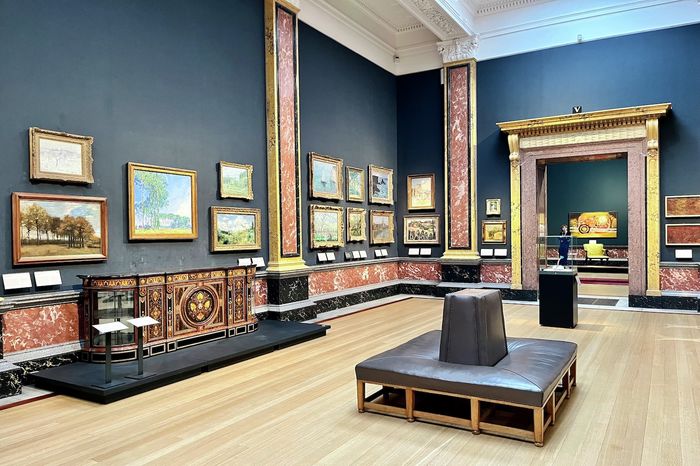The accidental galleries of Jesus Art Club
Saranka Maheswaran enters into an exhibition with only one rule for submissions: there aren’t any rules

What constitutes art? The ever-persisting debate – what should and should not be classified as art. Usually, ‘modern art’ is slated as easy: a quick way to make money through cheap symbolism. It seems that art ultimately garners public respect when the piece’s origin is a story of hardship, or an initial rejection of an art style or content. The Impressionists and the Pre-Raphaelite Brotherhood were both movements which in their time failed to capture audiences as they do today, now adorning almost every gallery wall. Daring to class us all as artists, Jesus College Art Club – run by final year medic Fatima Eshani – created an exhibition which opposes this stance, wanting us all to discover our own artistic potential.
Fatima came across the club in her fourth year as her friends on a three-year tripos moved out of college and she wished to forge a greater sense of community in their absence. Initially founded by Jean Bacon, a fellow at the college, Fatima found herself “at [her] calmest” in this group. Using a new space to develop their exhibition, the club had an unusual requirement for submission: that there were no requirements. Any style or form of art could be submitted by students for display. To art curators, this might sound experimental – the most credited exhibitions have a strong central theme grounding the curatorial process, or focalise a single artist or collective. Yet Jesus College Art club produced an exhibition which, despite featuring a series of different artists with a multitude of styles, maintained a cohesive sense of collectivity and collaboration.
“The club had an unusual requirement for submission: that there were no requirements”
The exhibition had everything – ranging from renditions of Van Gogh’s ‘Wheat Field with Cypresses’ (1889) to lanterns adorned in blossoms and flowers under the guise of mosaics, as well as Fatima’s own eclectic rendition of a disco edition of Jesus College. Although on paper it may come across as odd and mismatched, the exhibition itself was inviting and easy to navigate. Themes may have shifted and ideas differed between artists, but you could not help but be truly engrossed by each piece, all evoking genuine joy.
The novelty of the psychedelic section, bursting with vivid colours, was not disrupted, but complemented by more formal art styles such as Jean’s portraits of the art club members. Fatima explained how, when it came to deciding how the exhibition would be laid out (done mainly the night before, from 10pm till the early hours of 2am) the committee found themselves moving the work around to find natural complementation between seascapes and flowers, but also finding unfamiliar harmonies in colours and fruit.
“To decide that all art has an intrinsic value, simply needing to be found, is daring”
Fatima asserts that “art is very subjective”, and the scope of art stretches far beyond “technical skills”, making clear the importance of validating art in all its iterations. It’s easy to criticise something, deciding it is not ‘real art’ – however to decide that all art has an intrinsic value, simply needing to be found, is daring, particularly in the academic space of Cambridge that has a tendency to expect wondrous perfection. The society hopes that by hosting these exhibitions people will begin to see real value in their work. Fatima explained how one of the artists was willing to charge very little for their art when enquiries were made by guests, having to be reminded that their work was considered genuinely beautiful, and they should charge appropriately for this beauty. By hosting this exhibition, the society has been able to ensure that their artists know that they “deserve to be in these spaces”, which they think “will only encourage people”. While the confidence and creativity the Jesus Art Club imparts is impressive, the concept of value through pricing is an interesting one; when we sell art do we lose its intrinsic value, the fact that it brings a sense of calm or joy simply in the act of its creation?
Fatima did not expect people would want to buy pieces when she planned the exhibition, and the discussion of pricing came about organically. The exhibition is about ensuring artists “can make those decisions for themselves while realising the value in their work”. Yet the value in the club is not in the art, but in the forming of friendships that grow as their work does. Jesus Art Club is a space where “everything works and nothing is weak”.
The club will host another exhibition from the 7th to the 14th of June with submissions open to the whole university. The work will be exhibited in Jesus College’s Art studio and gallery on 18a Jesus Lane. Email Jean Bacon (jmb25@cam.ac.uk) if you would like to exhibit any work at the next exhibition.
 News / Eight Cambridge researchers awarded €17m in ERC research grants27 December 2025
News / Eight Cambridge researchers awarded €17m in ERC research grants27 December 2025 News / Clare Hall spent over £500k opposing busway 24 December 2025
News / Clare Hall spent over £500k opposing busway 24 December 2025 Comment / League tables do more harm than good26 December 2025
Comment / League tables do more harm than good26 December 2025 News / Caius mourns its tree-mendous loss23 December 2025
News / Caius mourns its tree-mendous loss23 December 2025 Comment / The ‘class’ of Cambridge24 December 2025
Comment / The ‘class’ of Cambridge24 December 2025










